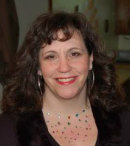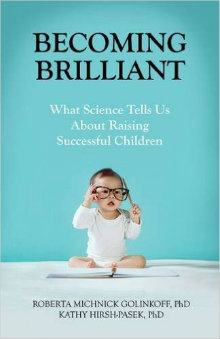Bright Happy Children vs Failing Public Schools
Becoming Brilliant: What Science Tells Us About Raising Successful Children
By Roberta Michnick Golinkoff PhD and Kathy Hirsh-Pasek PhD
(APA LifeTools, 2016 – Learn more)

Becoming Brilliant: What Science Tells Us About Raising Successful Children is a misleading title. The book is less about any traditional, or even growth mindset-based definition of intelligence, than it is about helping children become, as one of the authors (both are psychologists) explains, “happy, healthy, thinking, caring, and social children so that they become collaborative, creative, competent, and responsible citizens tomorrow.” This is a viewpoint that most teachers of middle grade students also embrace.

There are very bright moments in the narrative that implore parents to stop buying gadgets, gimmicks, and phones for their children and instead to allow them space and time for unmanaged play and for building relationships. Similarly, there is advice for teachers to increase problem-solving, creating thinking, and collaboration in their classrooms. The authors implore readers to redefine what intelligence looks like.
Focusing on the soft skills
In this spirit, the bulk of the book centers on the importance of helping children acquire what the authors call the 6Cs: collaboration, communication, content, critical thinking, creative innovation, and confidence.
Five of these 6Cs fall under the umbrella of so-called “soft-skills.” These skills, the authors contend, are at least as important, if not more important, than the last C, content, or the hard academic skills schools that parents tend to focus on. The writers say that when we help children gain competence in all 6Cs, we are taking steps that will allow them to be happy, healthy, successful adults.
Most teachers of middle grades students would agree so far, right? But, here comes the rub: almost immediately the book takes a hard turn to the right and a very dim view of public schools. This becomes apparent in the introduction where the authors ask a series of “what if…” questions.
What if the classroom could become a rainforest where students could be surrounded by paper mache monkeys and trees? What if report cards measured soft skills? What if parents were empowered to choose better schools for their children? Or if they had the knowledge to present to the PTA on how kids learn? Or write letters to the school board or Congress to (presumably) ask why their children’s classrooms aren’t becoming rainforests?
Tarring with a broad brush
Then, as if to appease any teachers who might be reading, they add this ringer — What if we were to organize a teacher appreciation day? I am not sure how this fits, and I can say honestly, that it did not appease me. Neither did the first four chapters, which are highly critical of schools. Below is a brief summary of each chapter.
Chapter 1: The case is made that schools are failing to educate our children to become 21st century students.
Chapter 2: The authors present a history of how our schools began to fail their students and communities. From Sputnik to the Common Core State Standards, the authors chronicle their view of the roadmap that led us our current school system.
Chapter 3: Here we get overviews of what are often viewed as more successful educational systems such as those in Finland and Singapore. A discussion of the idea of “glocal” solutions, or how global knowledge can help solve local education problems, is offered.
Chapter 4: The authors argue the need for a balance between hard and soft skills. Again, the authors contend, probably rightly so, that schools and parents often focus too heavily on content, which is but one C!
Chapters 5-10: These chapters offer a close look at the each of the 6Cs in turn.
Chapter 11: A discussion of what a report card for the 21st century should look like, with soft skills at the center. This is where the most helpful tool for middle grades teachers is shared in detail, a development rubric for each of the 6Cs (p. 250).
Raging against the machine
Throughout the book there is a focus on kids being happy and social rather than rote learning machines. Again, most educators would agree with these priorities. That said, I would not recommend it be given a space on the reading lists of middle grades teachers.
There are many terrific, solution-based, books that highlight much of the same thinking about where we need to go, yet take a less demoralizing approach for teachers. Instead of Becoming Brilliant, try reading Carol Dweck’s Mindset, Malcolm Gladwell’s The Outliers, Dan Pink’s Drive, Paul Tough’s How Children Succeed, or Angela Duckworth’s Grit.
Rita Platt (@ritaplatt) is a National Board Certified teacher with master’s degrees in reading, library, and leadership. Her experience includes teaching learners in remote Alaskan villages, inner cities, and rural communities. She currently is a teacher-librarian, teaches graduate courses for the Professional Development Institute and writes for We Teach We Learn.



































Rita, thanks for this review. Apparently these authors have not done their research on schools that succeed. I’m glad you recommended alternate books because the cover of this one is enticing. Teaching these “soft skills” is one thing; grading or assessing empathy, compassion, etc. is something I personally don’t want to see “standardized.”
You bet, Mary! I hope you like one of the other books. :)